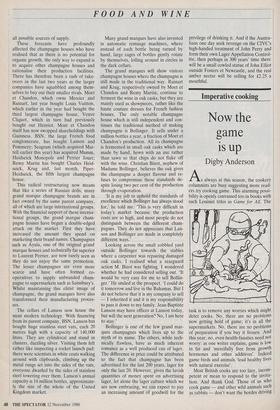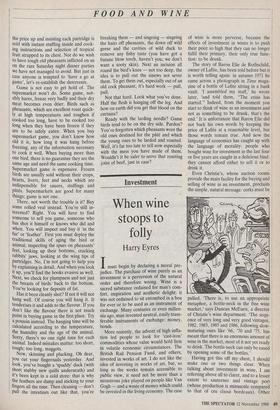Imperative cooking
Now the game is up
Digby Anderson
s always at this season, the cookery columnists are busy suggesting more read- ers try cooking game. This alarming possi- bility is openly canvassed too in books with such Leninist titles as Game for Ali. The task is to remove any worries which might deter cooks. No, there are no problems now getting hold of game; it's in all the supermarkets. No, there are no problems of preparation if you buy it frozen. And this year, no, even health-fanatics need not worry: as one writer explains, game is low in fat and 'mercifully free from growth hormones and other additives'. Indeed game birds and animals 'lead healthy lives with natural exercise'.
Most British cooks are too lazy, incom- petent or mean to respond to the invita- tion. And thank God. Those of us who cook game — and other wild animals such as rabbits — don't want the hordes driving
FOOD AND WINE
the price up and insisting each partridge is sold with instant stuffing inside and cook- ing instructions and selection of tropical fruit strapped to its chest. Nor do we wish to have tough old pheasants inflicted on us on the rare Saturday night dinner parties we have not managed to avoid. But just in case anyone is tempted to 'have a go at game', let's re-establish the deterrents.
Game is not easy to get hold of. The supermarket won't do. Some game, not- ably hares, freeze very badly and their dry meat becomes even drier. Birds such as pheasants, which are excellent roast quick- ly at high temperatures and toughen if cooked too long, have to be cooked too long when they have been frozen if they are to be safely eaten. When you buy supermarket game, you don't know how old it is, how long it was hung before freezing, any of the information necessary to cook it well. When buying more than one bird, there is no guarantee they are the same age and need the same cooking time. Supermarket game is expensive. Frozen birds are usually sold without their crops, hearts, livers, feet and necks which are indispensible for sauces, stuffings and pates. Supermarkets are good for many things; game is not one.
There, not worth the trouble is it? Buy some rolled veal instead. You're still in- terested? Right. You will have to find someone to sell you game, someone who has shot it himself or knows who did and when. You will inspect and buy it 'in the fur' or 'feather'. First you must deploy the traditional skills of aging the bird or animal; inspecting the spurs on pheasants' feet, looking up their bottoms, cracking rabbits' jaws, looking at the wing tips of partridges. No, I'm not going to help you by explaining in detail. And when you look it up, you'll find the books evasive as well. Next, we check for plumpness and not just the breasts of birds: back to the bottom. You're looking for deposits of fat. Has it been cleanly shot? If not it will not hang well. Of course you will hang it. It tenderises it and adds to the flavour. If you don't like the flavour there is not much Point in buying game in the first place. Try a poussin instead. The hanging time will be calculated according to the temperature, the humidity and the age of the animal. Sorry, there's no one right time for each animal. Indeed mistakes matter: too short, tough; too long, maggots. Now, skinning and plucking. Oh dear, you cut your fingernails yesterday. And look, you've bought a `spuddy' duck (with short stubby new quills underneath) and it's been kept in a cold store: that is why the feathers are damp and sticking to your fingers all the time. Then cleaning — don't pull the intestines out like that, you're breaking them — and singeing — singeing the hairs off pheasants, the down off wild geese and the cavities of wild duck to remove any fishy taste (you have got a butane blow torch, haven't you; we don't want a sooty skin). Next an incision all round the bird's knee — not too deep, the idea is to pull out the sinews not sever them. To get them out, especially out of an old cock pheasant, it's hard work — pull, pull. Not that hard. Look what you've done. Half the flesh is hanging off the leg. And how on earth did you get that blood on the curtains?
Ready with the larding needle? Game birds tend to be on the dry side. Pardon? You've forgotten which pheasants were the old ones destined for the pate and which the young ones to be larded and roasted. Well, it's far too late to tell now especially with the mess you have made of them. Wouldn't it be safer to serve that roasting joint of beef, just in case?











































































 Previous page
Previous page